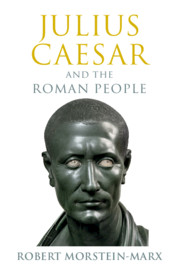Book contents
- Julius Caesar and the Roman People
- Julius Caesar and the Roman People
- Copyright page
- Dedication
- Contents
- Figures
- Acknowledgments
- Abbreviations
- Chapter 1 Introduction
- Chapter 2 The Early Caesar
- Chapter 3 Caesar’s “Entry into History”
- Chapter 4 Caesar’s First Consulship
- Chapter 5 Caesar in Gaul
- Chapter 6 No Return
- Chapter 7 Taking Sides
- Chapter 8 Caesar’s Leniency
- Chapter 9 En Route to the Parthian War
- Chapter 10 Conclusion
- Appendices
- Works Cited
- Select Index of Passages Cited
- General Index
Chapter 2 - The Early Caesar
Published online by Cambridge University Press: 05 August 2021
- Julius Caesar and the Roman People
- Julius Caesar and the Roman People
- Copyright page
- Dedication
- Contents
- Figures
- Acknowledgments
- Abbreviations
- Chapter 1 Introduction
- Chapter 2 The Early Caesar
- Chapter 3 Caesar’s “Entry into History”
- Chapter 4 Caesar’s First Consulship
- Chapter 5 Caesar in Gaul
- Chapter 6 No Return
- Chapter 7 Taking Sides
- Chapter 8 Caesar’s Leniency
- Chapter 9 En Route to the Parthian War
- Chapter 10 Conclusion
- Appendices
- Works Cited
- Select Index of Passages Cited
- General Index
Summary
Caesar, a patrician war hero already from his youth, followed the model of the Scipiones in the combination of a patrician pedigree with a "popular" political stance and the pursuit of military glory. Despite his family connection, he was no "Marian" in the strong sense of reviving and refighting the battles of the 80s. By the time of his entry in 63 on the highest stage of politics, he was known as a popularis of a particular sort: one exceptionally skilled at cultivating the support of the Roman People but not a demagogue or even a significant player in the classic popularis proposals for land redistribution, debt relief, or the like. Caesar’s reputation for "largesse" does not seem to have exceeded the norms of his day, or perhaps even what many of his contemporaries considered to be mere necessity. The best evidence suggests that his objective at this time was, as Sallust writes, to obtain "a great command, an army, a new war in which his excellence could shine forth." But that path lay through the Senate. Like many aristocrats Caesar did not shy away from a feud with a powerful figure (Q. Catulus), but that did not put him at odds with the aristocracy as a whole.
- Type
- Chapter
- Information
- Julius Caesar and the Roman People , pp. 33 - 82Publisher: Cambridge University PressPrint publication year: 2021

